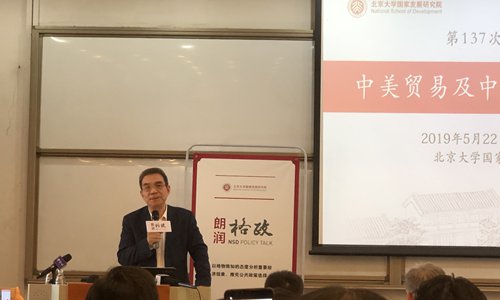HOME >> BUSINESS
Trade war to become 'white hot' in summer: expert
By Chu Daye Source:Global Times Published: 2019/5/22 22:47:00

Justin Lin Yifu addresses an audience at a seminar on Wednesday at Peking University. Photo: Chu Daye/GT
The US' theoretical grounds for slapping tariffs on Chinese goods are flawed and China can withstand a tariff war by diversification efforts and its rich box of policy tools, Chinese analysts said on Wednesday.
They also warned that the US-China trade war will become white hot this summer, as both sides exchange measures and countermeasures. But the US will seek talks in about three months' time, some said at a seminar held at Peking University in Beijing.
The comments came as the US hiked tariffs to 25 percent on $200 billion worth of Chinese exports with Chinese countermeasures on tariffs on $60 billion worth of US exports set to take effect on June 1.
They also came as the Trump administration shifted the tension toward the technology sphere, first by announcing a ban on the supply of key components by US companies to Huawei, then releasing a 90-day suspension plan.
On Wednesday, it further shifted its target by reportedly blacklisting Chinese video surveillance equipment provider Hikvision.
As the trade war drama evolves, the Trump administration's real intention to contain China's development is becoming clear, prominent domestic economist Justin Lin Yifu said at the seminar.
China will never forfeit its right to develop, Lin, a former senior official at the World Bank, said.
The theoretical grounds upon which the US launched its tariff war against Chinese goods is flawed, experts said, with some key aspects of it supported by only shoddy evidence.
Exports accounted for about 20 percent of China's GDP in 2018, and exports to the US accounted for about 20 percent of total exports, experts said. That means exports to the US, even facing broad tariff hikes, have a limited impact on the Chinese economy. Exports can be re-directed by diversification efforts to other markets such as the EU, Japan and South Korea.
To tackle the US high-technology ban, China could turn to other vendors such as the EU, South Korea and Israel, as well as the island of Taiwan, they said.
Yu Miaojie, deputy dean with the National School of Development at Peking University, said there can be different approaches to US companies.
"Upstream US companies are generally against the trade war approach of the Trump administration, and they deserve better treatment. Companies closely tied to the Trump administration can be treated otherwise," Yu told the Global Times on Wednesday.
In May and June, the trade war is expected to further escalate, Yu said. Things are expected to cool down by the end of the summer, he said.
Moreover, the US tariffs have already been to some extent alleviated by China's increased support to exporters with a flexible tax rebate program and yuan exchange rate. Tax reductions that have taken effect since April also helped China's exporters.
US tariffs have so far failed to harm China physically, "but we need to convey the idea to the public to avoid harm in the psychological sense," Yu said. "The only thing to fear is fear itself," Yu said.
With applications by interested parties, the US Trade Representative's Office has exempted 1,934 items from its tariff list on $34 billion worth of Chinese imports imposed since July 2018, according to the China Chamber of Commerce for Import and Export of Machinery and Electronic Products on Wednesday.
Posted in: ECONOMY